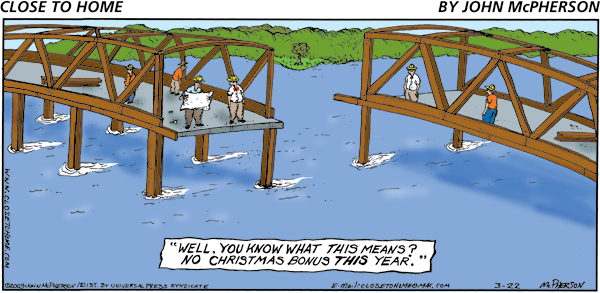 In Stephen Covey’s insightful book, The 7 Habits of Highly Effective People, one of the habits is to “start with the end in mind.” Before you begin a project, have a clear picture in your mind as to what the final product will look like. That’s good advice.
In Stephen Covey’s insightful book, The 7 Habits of Highly Effective People, one of the habits is to “start with the end in mind.” Before you begin a project, have a clear picture in your mind as to what the final product will look like. That’s good advice.
But sometimes it’s best to adopt the opposite strategy: start a project even though you don’t know how it’s going to turn out, in which case you’ll “build the bridge as you walk on it.”
The former strategy (start with the end in mind) is preferred because you can move fast, not waste resources and momentum through trial and error, easily communicate the project to team members, stay on budget, and enjoy a predictable process and conclusion. It’s a very efficient model. For example, if you’re going to build a house, have detailed drawings about every major and minor aspect before work commences, and the project can progress more smoothly.
But sometimes you might have a young, unformed idea that you want to pursue (perhaps an entrepreneurial pursuit) and you don’t have a clue as to what the end might look like, in which case, you just need to start. For example, my daughter, Lauren, recently started a new business dealing with environmental sustainability. Her business plan was novel. When she launched the business all she could see were the first few steps (trademark the name, start an LLC, open a checking account, build a basic website, etc.). After that, she just “walked through the fog” each day (for the first few years) until a clear and viable business formed.
Sometimes you do know exactly what you want to accomplish but don’t know how it’s going to happen, in which case, you also just need to start. For example, when I finished my undergraduate degree, I knew I wanted to earn a Ph.D. so I promptly registered for graduate school. I had no idea how I was going to pay for it, how I would negotiate school with the demands of a young family and work, what was involved in completing the degree, and whether or not I had the moxie to finish. The “end in mind” wasn’t ambiguous, but how to get there was. I naively launched into the unknown and five years later had the post nominal.
Perhaps I’m describing the difference between an explorer (someone who starts without the end in mind) and a pioneer (someone starts with the end in mind). An explorer has a general goal (ex. discover the new world) but is not sure how to get there; he has a compass but no map. A pioneer follows the path forged by the explorer (he has an end in mind), and may even improve the process. An explorer has a high tolerance for risk—failure is an option; for a pioneer, less so.
I’m not advocating that you identify exclusively with one approach or the other. In the course of life you’ll probably engage in both. I have found it helpful to recognize which role I’m adopting because the demands are different.
[reminder]What are your thoughts about this essay?[/reminder]

You never fail me with your thoughtful treatises. Sometimes you open my mind. Sometimes you reinforce thoughts that I, too, have had. Regardless, you add value. With so much content available, with less and less time available, we all need to be selective on how we consume that time. Thank you for your timeless contribution to my life and others’.
Jennifer, thank you for kind and encouraging words. You made my day (and perhaps my week…month). Don
I had a little giggle when I read this article as one of our interview questions is built around “start with the end in sight”.
For those who are less willing to take risks, a model project might be an option. By carrying out a small scale project, you can decide how much you are willing to commit in time and money and investigate how others “warm” to your idea.
In the UK, we have had a number of major projects which have bombed spectacularly or have started to escalate in cost beyond anyone’s expectations. I don’t know if you have heard of the HS2 rail project but it’s future seems very much in the balance at the moment.
Thanks, Angela, for taking the time to write. I like the idea of committing to a small iteration of a project – a type of prototype. We’ve been closely following the Brexit debacle; it will be interesting to see how that is resolved.
Don